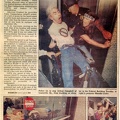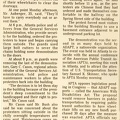The Atlanta Constitution
For 121 Years the South's Standard Newspaper
TUESDAY, SEPTEMBER 26, 1989
SPORTS FINAL
Photo: A tall man holding a toddler in one arm stepping over and between two motorized wheelchairs blocking the passage. One woman [Christine Coughlin] in a red jacket and headband faces the camera, while the other wheelchair user, in a blue jacket and hood, faces away.
Photo by DIANNE LAAKSO/Staff
Caption: A man steps over protesters in wheelchairs blocking the doors of the Richard B. Russell Federal Building on Monday.
Bush Order Lets Disabled Resume Courthouse Sit-In
Protesters Demanding Access To U.S.-Funded Transit Systems
By Pat Burson and Alma E. Hill, Staff Writers
After occupying the plaza floor of the Richard B. Russell Federal Building for eight hours Monday, more than 100 disabled activists were evicted at the close of the business day. only to be allowed back inside alter President Bush personally intervened.
Boxed quote on the side: "The decision is to let them stay in the building because of the president's deep commitment to the handicapped and their right to protest" -- Gary Cason, GSA
Main story: The protesters, who formed a human blockade near the main entrances to the 26-story tower about 10 a.m. Monday, vowed to remain until federal regulators require wheelchair lifts on all buses purchased with federal dollars.
“We're here until the order gets signed," said Michael W Auberger of Denver, one of the co-founders and organizers for American Disabled for Accessible Public Transportation (ADAPT).
Mr. Auberger and other demonstrators from throughout the country lined their wheelchairs two and three deep near the doorways to the federal building, located at the corner of Spring Street and Martin Luther King Jr. Drive, trying to stop anyone from leaving or entering.
Mr. Auberger, who has been disabled since he suffered a spinal cord injury 17 years ago, and others blocked revolving doors by attaching chains and iron bicycle locks around their necks and locking them to door handles. a tactic used to prevent security from simply lilting protesters out of their wheelchairs to clear the doorways.
At one point Monday afternoon, Mr. Auberger, 35. said, “They‘ll have to carry everybody out or arrest them."
At 6 p.m., Atlanta police and officers from the General Services Administration, who provide security for the building, ordered the protesters to leave and began carrying them outside. The guards used large bolt cutters to sever the chains holding some demonstrators to the doors.
At about 8 p.m., as guards were removing the last of the demonstrators, Gary C. Cason, regional administrator of the General Services Administration, told police and maintenance workers to allow the protesters back into the building.
“The decision is to let them stay in the building because of the president's deep commitment to the handicapped and their right to protest," Mr. Cason said.
Mr. Cason said Mr. Bush also said he was concerned about the protesters sitting outside in the chilly overnight temperatures and rainy mist. Maintenance crews appeared a half-hour later with blankets. and cots were promised. Mr. Cason said the protesters would be restricted to the lobby floor and would have access to the restrooms.
Protest organizers credit White House counsel C. Boyden Gray for Mr. Bush's action. Mr. Auberger said they contacted Mr. Gray, who took their case to Mr. Bush.
The president then called the head of the GSA, Richard G. Austin, in Washington, telling him to allow the demonstrators back inside.
Mr. Auberger said the group planned to stay in the building overnight and would block the entrances again at noon if the Transportation Department does not order changes in transit-access rules.
“At noon the administration has to decide whether or not they are going to arrest us, or we're closing the building do\vn again," he said shortly before 11 p.m., as the protesters ate Chinese food they had ordered and made themselves comfortable in the hallway on the Spring Street side of the building.
The protest forced most visitors to the building Monday to use a basement entrance adjacent to an underground parking lot.
The demonstration was the second in as many days held by ADAPT, a nationwide organization. The event was held in Atlanta to coincide with the annual conference of the American Public Transit Association (APTA), meeting this week in Atlanta, and to attract the attention of U.S. Transportation Secretary Samuel K. Skinner, who spoke to APTA Monday morning.
APTA opposes legislation pending in Congress — that ADAPT supports — called the Americans With Disabilities Act. The proposal would remove barriers in public transportation by requiring public transit authorities to have wheelchair lifts on any new buses purchased 30 days after the measure was enacted. APTA officials say they oppose that portion of the measure because it would cut into limited federal funds.
While Mr. Skinner has said he supports the bill, ADAPT wants him to issue an executive order so the stipulation can take effect immediately prior to congressional action. Protesters demanded to talk with Mr. Skinner while he was in Atlanta, but Mr. Skinner departed for St. Croix without meeting with them. Robert Marx. a spokesman for Mr. Skinner, said the secretary does not have the authority to issue such an order, only the president.
[This is a combination the story on ADAPT 498 and 497]
- Created on
- Friday 12 July 2013
- Posted on
- Wednesday 8 April 2015
- Albums
- Visits
- 2298
- Rating score
- no rate
- Rate this photo


0 comments